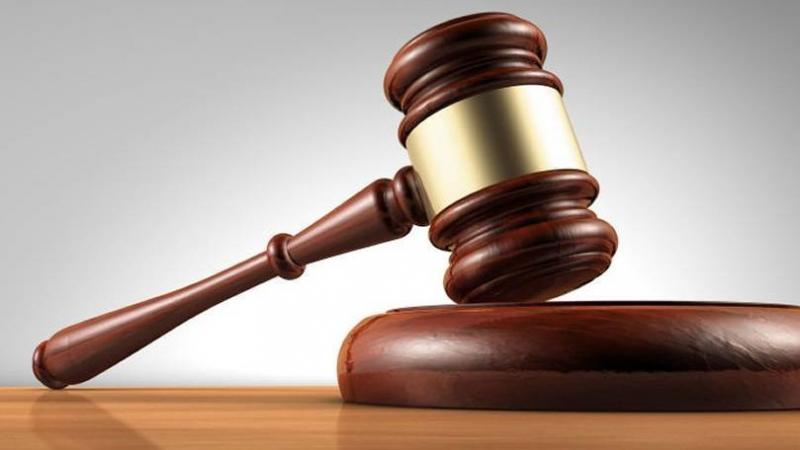There is no drinking water or electricity in the Courthouse of Baabda. Piles of garbage accumulate in the corners, and there are remnants of food in rotten bags on the stairs. The stench of filth wafts from the bathrooms that are out of order due to the lack of water and absence of regular maintenance and cleaning. The situation in the "Courthouse" in Baabda is no different from that in other courthouses in Lebanon, except for some scenes that suggest "life" despite the lack of the most basic elements needed for judicial work. There is no stationery, no stamps to complete transactions, and electricity only exists in the lockup and in the offices of some judges, which was provided some time ago through a cable from the nearby real estate building due to the need for lighting in the lockup, which requires continuous ventilation to ensure the safety of detainees and security personnel.
The hustle and bustle on the first floor of the Baabda courthouse suggests that life has returned to the place. Families gather in front of a courtroom. Others arrive in succession, immediately checking a list posted on the court's board with the names of the detainees who will be tried on that day. One woman raises her voice in prayer: "O Lord, grant us relief... we want to be done," echoed by an elderly woman who could not stand and sat on a rickety wooden chair: "God willing, he will be released today." One of them clutches a file and looks around saying: "It's good his name is on the list. It's a long wait, but the important thing is they brought him from jail; he is inside. I saw him from the window."
A woman enters the courtroom carrying a child, and exits minutes later in tears after seeing her husband on the courtroom dock. Minutes after the arrival of detainees from the Qubbeh, Roumieh, and Zahle prisons, the judge arrives around noon, and the trials are set to begin. Everything seems fine. The courtroom door opens, and names are called for entry into the hall. Moments later, the scene changes, and the hopes of the families evaporate as the sessions turn into preliminary questioning due to the absence of one of the advisors who is on strike.
Outside the trial rooms, stories unfold from those who recount suffering lasting for months, even years—not in objection to the detention of those proven guilty, but in condemnation of the procrastination in adjudicating cases and issuing judgments against those held in pretrial detention, whether in the courthouse lockup or in Lebanese prisons across various regions.
Samar, a mother of three children, the eldest of whom is 11, narrates a five-year ordeal since her husband was detained in Roumieh prison due to debts owed. "There may have been a fraud he committed to obtain this money, but is it reasonable to remain without trial for five years?" Samar works selling vegetables to support her children and cannot afford to hire a lawyer for her husband. All she does is submit a request for his release every now and then.
Soha came since 9 AM with a lawyer to attend the session for her son, who has been detained for a robbery committed a year and a half ago. The judge was present, but her son did not arrive as he was not brought from Roumieh prison. Soha's hopes were dashed; she had anticipated a ruling regarding her son, which "costs me a lot for him to be in prison. I visit him in Roumieh every while. I don’t like being humiliated; I kick him some money every time I go so he can buy his necessities. My financial situation is tough, and I’m forced to borrow just to give him. What should I do?"
A joyful woman breaks the grim scene for the families of detainees, holding a release paper for her son, climbing the stairs with a smile on her face as if she won the lottery. She precedes her words to everyone she meets: "The release went well. I will sign it and take him out to Roumieh. My son has been in prison for a year due to a motorcycle issue; thank God we are done."
The sound of the woman merges with a lawyer passing by talking on the phone to his client: "The bail amount has been set at 150 million lira; let's pay it and finish." The voices intermingle as a judge from one of the trial rooms announces the postponement of a trial session for two weeks to give disputants a chance to reach a "friendly solution."
### Movement of Lawyers
Lawyers clutch their files, moving between trial rooms on the first floor of the Baabda courthouse. They stand in front of the rooms, wait a bit, and then ask: "Has the judge arrived?" And if the answer is "no," the next question is: "When is the next session scheduled?" Following this, the lawyer raises his phone and calls his client to inform them that the session has been postponed to a later date.
In the corridor leading to the "Traffic Incidents" room, darkness envelops the place. If it were not for the cell phones gleaming on the wooden benches, one might not notice the presence of anyone in the area. Several lawyers sit on opposing wooden benches, browsing their files with the light of their phones, exchanging hopes for a near resolution of the judicial situation. An elderly man, wearing a keffiyeh on his head, shares the bench with them, holding papers, which he occasionally flips through, attempting to understand their contents. Moments later, his lawyer arrives. He stands in greeting, handing him the papers, saying: "Hopefully, it will be okay."
Across from the corridor, a lawyer and a female lawyer exchange words about the situation: "Things are not progressing. If the judge arrives, there is no transportation for the detainees. And if the detainees are brought, the judge does not show up. The clients are not paying either to find a resolution. The situation is stagnant."
### Judicial Assistants
This might be the most challenging phase for judicial assistants in Lebanon at the moment. These individuals have long suffered from a lack of rights or incentives, and perhaps what distinguishes their current situation is that "things have gotten worse." The most basic elements needed for administrative work are unavailable. Stationery, pens, and paper are scarce, and when available, they are insufficient for all pens and do not meet the essential needs required to finalize and file judicial documents.
In small rooms packed with yellow files, from the top to the bottom, some files barely withstand the weight from the numerous metal cabinets. Judicial assistants work tirelessly to accomplish what they can, under the light of their phones, while one of them relies on a manual battery to record names and notes.
In addition to this, there is the problem of the absence of stamps and ink pads, which are absolutely necessary to facilitate the functioning of the judicial facility and finalize files appropriately.
### Stacking Files
The absence of mechanization in judicial facilities is one of the main problems that Lebanese courthouses suffer from. The central archive at the Baabda courthouse is no different from others, needing an application to access it due to the abundance of paper files and the difficulty of retrieving them. The process of searching for a file can take hours, especially with the power outages. One insider on the archive's situation said: "When the electricity was available, only one person would go down to retrieve several files. With the electricity gone, it has become difficult and almost impossible, as the light from the phone does not aid the retrieval process due to the severe darkness, and the archive is underground."
### No Drinking Water in the Lockup
Garbage is scattered everywhere in the Courthouse of Baabda, with trash cans overflowing with filth from all sides. The dirtiest sight is on the staircase leading to the lockup, where families gather awaiting their turn to confront the detainees. One of the family members remarks: "We are standing next to the garbage here to stay close and take our turn to confront in the lockup."




